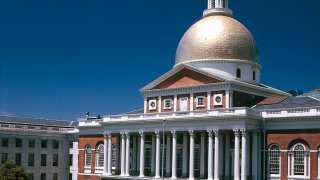
Massachusetts House leaders on Wednesday unveiled their version of the state budget for the fiscal year that begins July 1.
The $47.6 billion spending plan, which is expected to be debated the week of April 26, doesn't include any broad-based taxes or major changes to the state's tax code. It also doesn't factor in the approximately $4.5 billion in federal aid coming to Massachusetts.
The plan would increase spending by 2.6% over the current year's budget. It would also spend nearly $1.8 billion — or 3.9% — more than recommended by Republican Gov. Charlie Baker is his proposed budget.
The House budget tries to balance two priorities — caring for the immediate needs of residents caused by the pandemic, while also looking ahead to helping create new job opportunities — Democratic House Speaker Ronald Mariano told reporters Wednesday.
Mariano said the House would prefer to spend the $4.5 billion in federal aid in a separate spending package, rather than lump it into the state's 2022 fiscal year budget plan.
"We will move on, deal with our budget now and sometime probably around June deal with the financial impact of the federal monies, how best to spend that," he said.
U.S. & World
Massachusetts has been enjoying relatively good stability despite the pandemic, which clobbered many businesses.
But Democratic leaders in the House said the state needs to move cautiously and Mariano warned that the revenue projections for the state are still more than $1 billion below projections in January 2020 — just before the pandemic hit and Baker declared a state of emergency that shuttered nonessential businesses.
The state may also avoid having to dig as deeply into its $3.5 billion "rainy day fund" as initially thought to balance the budget.
The House spending plan also includes a nearly $220 million increase in "Chapter 70" education aid to school districts — more than the nearly $198 million hike proposed by Baker in his budget plan.
It would also create a $40 million reserve fund to help stabilize school districts adversely impacted by pandemic-related enrollment changes.
The House is planning to debate the budget and any proposed amendments to the massive document before shipping it off the Massachusetts Senate.
The Senate, in turn, will come up with its own version of the budget which it will also debate, along with proposed amendments, before passing it.
At that point the House and Senate versions of the budget while be handed over to a six-member conference committee made up of three House and three Senate members charged with the task of hammering out a single, compromise budget document.
That version will head back to each chamber for a final up or down vote, at which point the budget heads to Baker's desk for his signature,
Baker can also issue any vetoes he wants — which lawmakers have the option of trying to override. That's generally not too high a hill to climb, given the hefty Democratic majorities in both chambers.



